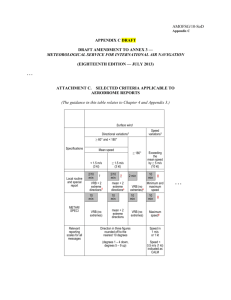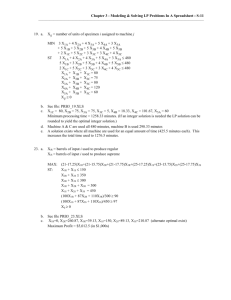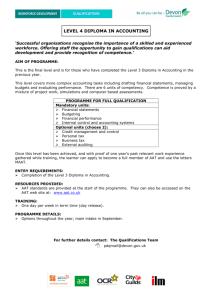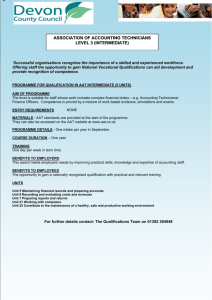About the VRB - Veterans' Review Board
advertisement
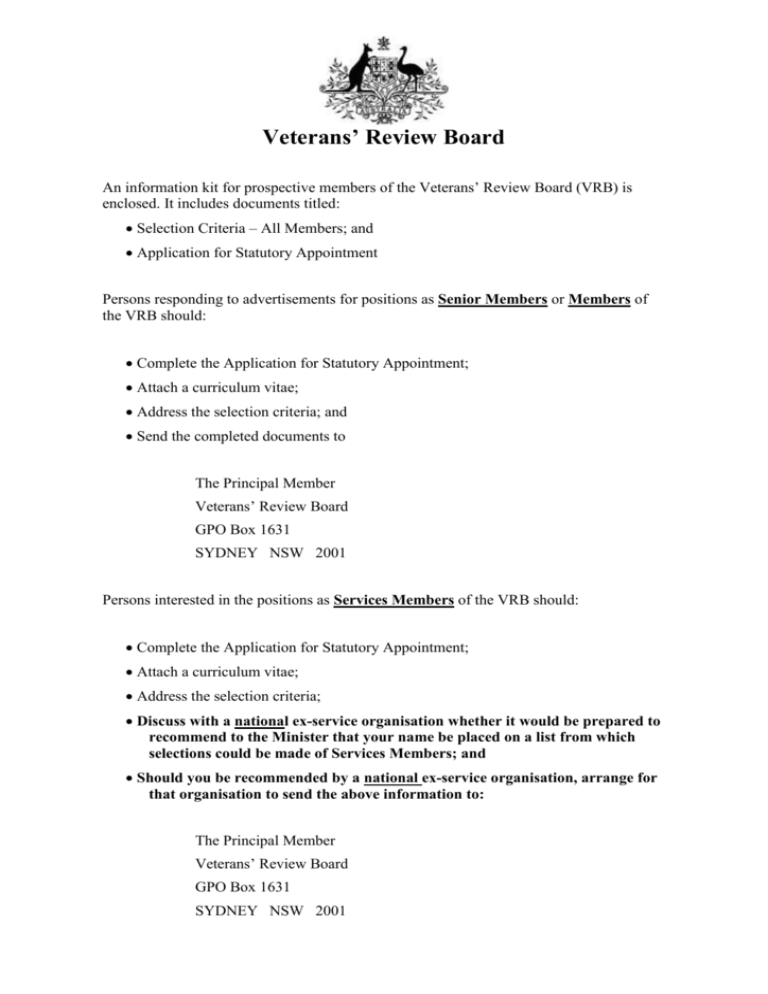
Veterans’ Review Board An information kit for prospective members of the Veterans’ Review Board (VRB) is enclosed. It includes documents titled: Selection Criteria – All Members; and Application for Statutory Appointment Persons responding to advertisements for positions as Senior Members or Members of the VRB should: Complete the Application for Statutory Appointment; Attach a curriculum vitae; Address the selection criteria; and Send the completed documents to The Principal Member Veterans’ Review Board GPO Box 1631 SYDNEY NSW 2001 Persons interested in the positions as Services Members of the VRB should: Complete the Application for Statutory Appointment; Attach a curriculum vitae; Address the selection criteria; Discuss with a national ex-service organisation whether it would be prepared to recommend to the Minister that your name be placed on a list from which selections could be made of Services Members; and Should you be recommended by a national ex-service organisation, arrange for that organisation to send the above information to: The Principal Member Veterans’ Review Board GPO Box 1631 SYDNEY NSW 2001 VETERANS’ REVIEW BOARD INFORMATION KIT FOR PROSPECTIVE MEMBERS This information kit is intended to assist people who may be responding to advertised vacancies in the membership of the Veterans’ Review Board (the VRB). It provides an overview of the purpose and operation of the VRB, selection criteria and a form of application. The kit is located on the VRB website at www.vrb.gov.au and should be read together with other material on that site. For example, under ‘publications’, the site includes the Annual Reports of the VRB, the VRB journal publication VeRBosity, papers prepared in the VRB, the Operations Manual of the VRB and the Service Charter. Under ‘Links’ on the site there are comprehensive links to instruments and determinations relating to eligibility, Repatriation Medical Authority Statements of Principle, the Veterans’ Entitlement Act 1986, the Guide to assessment of Rates of Veterans’ Pensions (GARP), the Military Rehabilitation and Compensation Act 2004 and many other pieces of legislation and caselaw relevant to the veterans jurisdiction. Familiarity with these materials and the capacity to utilise the site for research and educative purposes is an important factor in the functions of members of the VRB. December 2007 CONTENTS ABOUT THE VETERANS’ REVIEW BOARD Page N° About the VRB 1 VRB Panel Operations 3 Membership of the VRB 4 General Terms and Conditions 5 VEA determining system 6 MRCA determining system 8 Selection Criteria – All Members 11 -1- About the VRB Role of the VRB The role of the Veterans’ Review Board (VRB) is to provide independent merits review. The VRB is not a court, but a specialist high volume tribunal. Merits review involves the VRB ‘standing in the shoes’ of the original decision-maker, that is, to consider afresh the facts, law, and policy relevant to the decision under review, and to decide whether the correct decision was made. The VRB aims to do this in a manner that is timely, fair, impartial, of high quality, and with as little formality or technicality as possible. Establishment The VRB was established under the Repatriation Act 1920 and continued in existence by the Veterans’ Entitlements Act 1986 (VEA). Functions and powers The VRB reviews decisions made by officers of the Department of Veterans’ Affairs (DVA) who have been given power under the VEA by the Repatriation Commission to decide claims for pension and applications for increase in pension. These officers are called ‘delegates’ of the Repatriation Commission. The VRB’s role was extended in 2004 to review determinations under the Military Rehabilitation and Compensation Act 2004 (MRCA). It is concerned with rehabilitation, and compensation for members of the Australian Defence Force (ADF) and their families for injury, disease or death related to service rendered on or after 1 July 2004. In conducting a review, the VRB is not bound by the rules of evidence or any of the findings within the decision it is reviewing. Jurisdiction The VRB can review only particular types of ‘decisions’ and ‘determinations’ specified in the VEA and MRCA. While the VEA uses the term ‘decision’, the MRCA uses ‘determination’. Under the VEA, the VRB’s function is to review decisions of the Repatriation Commission concerning: claims for the acceptance of injury or disease as war- and defence-caused; claims for war widow(er)s’ pension and orphan’s pension; assessment of the rate of pension payable for incapacity from war- and defence-caused injury or disease; and claims for the grant of an attendant allowance. The VRB cannot review decisions relating to any other veterans’ benefits, allowances or pensions under the VEA such as those relating to medical treatment, or service pensions. -2- Under the MRCA, the VRB may review ‘original determinations’ of the Military Rehabilitation and Compensation Commission (MRCC) concerning a wide range of matters and benefits. These include whether the Commonwealth is ‘liable’ for an injury, disease or death, whether compensation is payable for incapacity for service or work, for permanent impairment, for cost of treatment, or whether various allowances and other benefits can be provided. The VRB may also review original determinations of a service chief of the ADF or a delegate of the MRCC concerning rehabilitation programs under the MRCA for members and former members of the ADF. Organisation The VRB members are statutory office holders appointed by the Governor-General. The VRB employs staff under the Public Service Act 1999. The VRB has offices in the Australian Capital Territory and all States of Australia, except Tasmania. Principal Member The Principal Member is responsible for the efficient operation of the VRB and the arrangement of its business, including procedures and the constitution of panels of members to hear cases. The Principal Member issues directions from time to time relating to the operations of the VRB. However, the Principal Member cannot direct any member on the law or on the decision to be made in a particular case. Membership The VRB carries out its functions by having panels of members hear cases. To establish their independence from the Department of Veterans’ Affairs (DVA), members of the VRB are appointed by the Governor-General for terms of up to 5 years. Members may be reappointed from time to time. Membership of the VRB is in a number of categories – the Principal Member, Senior Members, Services Members (selected from lists submitted to the Minister by ex-service organisations) and Members. VRB members have a wide range of expertise and experience. Each panel usually consists of a Senior Member, a Services Member, and another Member. Executive Officer The VRB’s Executive Officer is responsible to the Principal Member for the direction and coordination of the activities of the staff on a national basis. Registrars The Registrar in each state is responsible to the Executive Officer and the Principal Member for the administrative operations of the VRB in their state. Staff Members of the VRB are assisted by a number of staff. Those staff are provided to the Principal Member by the Secretary of DVA. The Australian Public Service Code of Conduct and Values set the standards of behaviour and conduct expected of VRB employees. DVA has no operational control over those staff while they work for the VRB. Registries The offices from which the VRB operates are called Registries. The Principal Registry of the VRB is in Sydney and there is a Registry in each mainland State capital. ACT cases are managed from the New South Wales Registry, Tasmanian cases are managed from the Victorian Registry and Northern Territory cases are managed from the South Australian Registry. -3- VRB Panel Operations The Principal Member of the VRB is responsible for the efficient operation of the VRB and may give directions for that purpose and as to the arrangement of the business of the VRB. Included in this responsibility is the authority to give directions as to the persons who will constitute panels of the VRB (see sections 142 and 143 of the Veterans’ Entitlements Act 1986). Panels are constituted by the Principal Member or a Senior Member, a Services Member, and one other Member (see section 141 of the Act). The Principal Member or a Senior Member presides at any hearing of a review (see section 146 of the Act) and questions before the VRB on a review are decided by a majority (see section 149 of the Act). The VRB is required to prepare a written statement setting out its reasons for decision, including its findings on any material questions of fact, and referring to the evidence or other material on which those findings were based. Three member panels of the VRB are convened in each state (for a week at a time) in block periods of five weeks (referred to at the VRB as an ‘itinerary’). Availability of members to sit is determined up to ten weeks in advance and the panels are convened by the Principal Member. This planning measure provides some certainty for part-time members involved in other activities. As a matter of practice, each panel sits for a week at a time and the present daily practice in each week involves preparation and hearing of three matters, write up of three decisions (one per member) and preparation for three hearings the following day. Members may be allocated to approximately 15-20 weeks of sittings in a year, depending upon the availability of matters ready for hearing. No guarantee can be offered as to the volume of work. It is clear that over 80% of applications for review are conducted in the eastern states. An effort is made to balance the workload among all members and to promote consistency in decision making and expertise nevertheless, the expense of travel may place some limits on these efforts. When determining appeals the VRB applies the law to the facts as found in each case. The VRB is bound to follow the law established in the Veterans’ Entitlements Act 1986 and the Military Rehabilitation and Compensation Act 2004 as interpreted in High Court and Federal Court decisions. Attention is paid to relevant AAT decisions and to policy guidelines established by the Commission, although these do not bind the VRB. The facts of the case are determined from the applicant’s files, from hearing and from evidence obtained from other relevant sources. The applicant may appear personally, be represented by a lay advocate of his/her choice or, if he or she wishes, may make submissions in writing. Legal practitioners are not entitled to represent applicants before the VRB. The Repatriation Commission or the Military Rehabilitation and Compensation Commission is a party to all proceedings before the VRB but as a matter of long practice, is not usually represented. The VRB has before it the respective Commission’s written statement of reasons and all documents relevant to the decision under review. VRB hearings do not establish precedent; nor may the Principal Member or Senior Member direct panels to come to a particular decision or to adopt a particular interpretation of the law. At the same time the Principal Member encourages VRB members to decide cases consistently and with an appropriate regard for government policy – where that bears on a decision. Appeal hearings are held in private. However, the Presiding Member at a hearing may give directions as to the persons who may be present. Hearings are essentially of an inquisitorial nature and are informal and non-adversarial in character. All proceedings are tape recorded and an applicant may seek a copy of the tape. -4- The VRB is not bound by rules of evidence. It is bound to act according to law, substantial justice and the merits and circumstances of the case. The VRB conducts proceedings in its own hearing rooms in most capital cities and in appropriate facilities in Canberra, Hobart and regional centres around Australia. Telephone hearings are sometimes utilised. Video hearings have been successfully conducted and may be utilised to a greater degree in coming years. Members are expected to type their own decisions using computer facilities provided by the VRB. Membership of the VRB Subject to the lawful directions of the Principal Member, members of the VRB are individually responsible for their role in deciding individual cases. Each member commits: to sit for a week at a time; approximately 15 to 20 weeks in a year (subject to availability of cases) as arranged by the Principal Member; to attend VRB hearings having fully prepared the cases for hearing; to attend a minimum of 15 minutes before the first hearing appointment time to enable preliminary panel discussions (assuming necessary preparation); to undertake to type the decision of the panel as allocated by the Senior Member; to produce the draft decision on the day of the hearing or at such later time as agreed with the Senior Member (subject always to directions of the Principal Member as to timeliness in decision finalisation); to attend members’ meetings as required; to bring to attention anomalies in legislation or policy; to conduct himself/herself in performing the functions of a VRB member in a professional and courteous manner – in this respect the VRB utilises the Guide to Standards of Conduct published by the Administrative Review Council in 2001 (see VRB website, www.vrb.gov.au). All members are required to participate fully in analysing the issues requiring determination, in the hearing process, and in making all findings necessary to reach a decision. Members bring to the VRB a variety of expertise. They are encouraged to become aware of and to draw on the expertise of colleagues. Senior Members Senior Members are drawn from persons with substantial legal experience. They provide leadership to panels in ensuring that proceedings are conducted objectively and fairly and that the law is appropriately applied. The Principal Member looks to Senior Members to ensure a high quality of final decisions of each panel, written in clear and plain language, which concisely explain findings of fact and the application of the law to those facts. -5- Services Members Services Members are nominated for selection to the VRB by ex-service organisations. They are invariably ex-service men and women themselves and bring long experience of service life, often including active service, to the VRB. At the same time, the ex-service organisations are not confined to recommendation of such persons. Members Members are drawn from a wide cross section of the community. In the past it has included nursing, welfare, farming, public service, business and a variety of other experiences. The VRB seeks to utilise this experience to achieve balance in its decision making. The essential skills of members include: the ability to listen carefully and to communicate in a courteous and non-confrontational manner; the ability to elicit personal information in a manner that preserves the dignity of applicants; the capacity to apply difficult concepts and rules with sound judgement; the capacity to analyse issues and material and identify the essential features; the capacity to reach a decision and to quickly, fluently, accurately and simply, commit it to paper. General Terms and Conditions Fees and allowances for the part-time members of the VRB are set by the Remuneration Tribunal. Current determination, made in respect of ‘Part-time Office Holders’ may be accessed at the Tribunal website www.remtribunal.gov.au. Currently (December 2007) Senior Member’s daily fees are set at $572 and Services Members and Members at $509 per day. Travel is at Tier 2 or business class. Members conduct hearings in rooms for that purpose in Registries or at such other regional locations as are arranged by State Registrars. Video conference facilities are available in Brisbane and Melbourne. Write up of decisions and reasons in Registry hearings are undertaken in offices utilising computer facilities provided by the VRB. A considerable volume of resource material is contained in an intranet site for use by VRB members. -6- VEA determining system Primary decision Once a claim is lodged at an office of DVA, the claim is investigated on behalf of the Secretary of DVA by a Claims Assessor. The Secretary of DVA has broad investigatory powers and can require information or documents to be provided by claimants and other persons or bodies. 1 After obtaining medical evidence, service records, and other relevant evidence, the Claims Assessor, as delegate of the Repatriation Commission, will determine the claim or application. Upon being given notice of a decision of the delegate of the Repatriation Commission the claimant or applicant may apply for review to the VRB. Section 31 review Once an application for review by the VRB is received by DVA, the application is considered by a senior delegate of the Repatriation Commission who has the power to review the primary decision under s 31 of the VEA. If the delegate chooses to do so and the decision is varied in some way, then the decision the VRB reviews is the primary decision as varied by the s 31 decision. A claimant may seek review under s 31 without also seeking review by the VRB. However, the claimant runs the risk that the period in which to apply for a review by the VRB will expire before the s 31 review has been completed. If the s 31 review delegate decides not to conduct a review, or just affirms the decision, the decision of the s 31 review delegate cannot be reviewed by the VRB.2 If an application had already been made to the VRB, then an applicant can seek a s 31 review at any time. Sometimes that is a simpler and more convenient way to get a resolution of a matter than by proceeding to a VRB hearing. The VRB encourages applicants to seek s 31 review if all the issues within an application can be resolved in that way. Administrative Appeals Tribunal Both applicants and the Repatriation Commission are entitled to apply to the AAT for review of a VRB decision to affirm, vary or set aside a decision reviewed by the VRB. The VRB is not a party to the subsequent proceedings before the AAT. There is no application fee for applying for a review by the AAT of matters under the VEA. Time limit in which to apply An appeal to the AAT must be in writing and should be lodged at an AAT Registry within 3 months of receipt of the VRB’s decision at the applicant’s postal address as last notified to the VRB.3 An application form for this purpose is available from the AAT although the use of the form is not essential. The AAT may extend the time for lodging an appeal up to 12 months after notice of the VRB decision, but the applicant must convince the AAT why an extension of time should be granted.4 1 VEA, s 127, s 128 VEA, s 31(10), s 31(11) VEA, s 176(4) 4 VEA, s 176(4) and AAT Act, s 29 2 3 -7- Outline of the VEA determining system Decision of Repatriation Commission delegate (s 19 or s 98) Possible intervention by Repatriation Commission delegate under s 31, VEA. Application for review by VRB (s 135, VEA): Assessment and Attendant Allowance matters — must apply within 3 months. Entitlement matters — may apply within 12 months, but must apply within 3 months for full backdating of pension if application is successful. Review by Veterans’ Review Board of s 19 or s 98 decision (or as varied under s 31) Application for review (s 175, VEA) by AAT must be within 3 months, but AAT can extend time to apply up to 12 months at its discretion. Review by Administrative Appeals Tribunal. -8- MRCA determining system Original determinations Once a claim under the MRCA has been lodged, it is investigated by the MRCC. The MRCC has broad powers of investigation and can require claimants and other persons or bodies to provide it with information or documents.5 Once the investigation has been completed into the matters relating to the claim, a decision called an ‘original determination’ is made by a delegate of the MRCC (or delegate of a Service Chief if the matter concerns rehabilitation of a serving member). The claimant is sent a copy of the determination, the reasons for the determination, and a notice of the claimant’s appeal rights. Review system The review system under the MRCA is different from that under the VEA, and it is important to note the differences. Under the MRCA, the claimant has a choice of first level merits review, either: to seek a ‘reconsideration’ under s 349 of the MRCA by an another delegate of the MRCC; or to seek a ‘review’ by the VRB under s 352 of the Act. If a person applies for reconsideration under s 349 the person cannot apply to the VRB. If a person applies to the VRB, the person cannot apply for reconsideration under s 349. Section 349 reconsideration An application for reconsideration by a delegate must be made within 30 days of the ‘original determination’ being given to the person. However, the delegate may grant an extension of time to apply for review. Once the original determination has been reconsidered, the reconsideration determination, reasons, and notice of appeal rights are sent to the claimant. Application to AAT following s 349 reconsideration If the person is dissatisfied with the reconsideration determination, an application for review must be made to the AAT by lodging a written application at a Registry of the AAT within 60 days of receiving notice of the reconsideration determination and reasons. The AAT has the discretion to grant an extension of time to apply for review. There is no application fee for applying for a review by the AAT of matters under the MRCA. VRB review Once an application is made to the VRB, an MRCC delegate examines the case to decide whether to do a ‘reconsideration’ under s 347 of the MRCA. If no reconsideration is done or the reconsideration does not change the original determination, the matter will proceed to the VRB. If the determination is revoked or varied under s 347 to the extent that there is a completely different determination from the original determination, the VRB application lapses. 5 MRCA, s 330, s 405, s 406 -9If the applicant is dissatisfied with a s 347 reconsideration determination that varied the original determination, a fresh application must be made to the VRB (or, instead, to a reconsideration delegate under section 349). A reconsideration under s 347 is regarded as a new ‘original determination’ for which there is a new appeal right, and another choice of appeal path. If the original determination is varied under s 347 but there is still an aspect of that determination that was unaltered, the VRB application may continue and the VRB will review that part of the determination that was not changed. Once the VRB has reviewed the original determination, the VRB’s determination, reasons and notice of appeal rights are sent to the applicant. Application to AAT following VRB review An application for review of the VRB determination may be made to the AAT by lodging a written application at a Registry of the AAT within 3 months of receiving notice of the VRB’s determination and reasons. The AAT has the discretion to grant an extension of time to apply for review, but only up to 12 months. The MRCC must prepare the s 37 documents for the AAT review within 28 days of notice from the AAT that the application for review has been lodged. Effect of choosing reconsideration – costs may be awarded by AAT If a claimant chooses the reconsideration path, then if the matter goes to the AAT and it is successful, the AAT may award legal costs to the applicant.6 (The AAT cannot award costs against an applicant.) If the claimant chooses the VRB review path, the AAT will not be able to award costs. 7 Effect of choosing VRB review – war veterans’ legal aid may be available at AAT If the claimant chooses the VRB review path and the application relates to warlike service or nonwarlike service rendered since 1 July 2004, the claimant will be eligible for non-means tested legal aid at the AAT under the war veterans’ legal aid scheme provided the case has some prospect of success (that is, a merits test applies). Legal aid under the war veterans’ matters guideline is not available if the claimant chooses the reconsideration path or the application relates only peacetime service. Other legal aid If the person is not eligible under the war veterans’ matters guideline, legal aid might be available under the social security and other Commonwealth benefits guideline. This is subject to a means test as well as a merits test and applies to limited types of cases. Legal aid under the social security and other Commonwealth benefits guideline might also be available, subject to a means test and a merits test, if the person chose the reconsideration review path instead of the VRB review path. 6 7 MRCA, s 357, s 358 MRCA, s 359 - 10 - Outline of the MRCA determining system Determination by delegate of MRCC or Service Chief Claimant has choice of review path Application for review by VRB (s 352, MRCA) may apply within 12 months, no extension of time permitted. Review by Veterans’ Review Board (unless varied under s 347, MRCA) Application for review (s 354, MRCA) by AAT must be within 3 months, but AAT can extend time to apply up to 12 months at its discretion. Review by Administrative Appeals Tribunal. AAT cannot award costs. War veterans legal aid scheme (no means test) available only if application concerns warlike or non-warlike service. General legal aid available (means tested). Possible intervention by MRCC delegate under s 347, MRCA. If determination varied under s 347, VRB review lapses. A new VRB application can be made if claimant is still dissatisfied. Application for reconsideration (s 349, MRCA) must apply within 30 days, may extend time at discretion. Reconsideration under s 349, MRCA, by MRCC or Service Chief delegate Application for review (s 354, MRCA) by AAT must be within 60 days, but AAT can extend time at its discretion. Review by Administrative Appeals Tribunal. AAT can award costs to claimant if successful. War veterans legal aid scheme not available. General legal aid available (means tested). - 11 - Selection Criteria – All Members Essential requirements for all applicants are: knowledge of administrative review principles; analytical ability – capacity to analyse evidence, to interpret legislation and case law and to apply same to findings of fact; personal attributes of empathy, judgement and independence of mind, together with capacity to work as a team member and meet performance standards; communication skills – high standard written and oral communication skills and strong listening skills; capacity to type decisions quickly and accurately and to utilise computer technology; Availability to travel interstate as required. Desirable attributes include: knowledge of veterans’ and military compensation; knowledge/interest in military history and or conflict/peacekeeping. Australian participation in All persons interested in appointment must complete an Application for Statutory Appointment available from the Veterans’ Review Board’s website at www.vrb.gov.au, and attach it to a document addressing the selection criteria. Persons interested in appointment as a Senior Member or Member must make an application by close of business on 4 January 2008 to the Principal Member of the Veterans’ Review Board, GPO Box 1631, Sydney NSW 2001. Applications may be submitted in electronic form to the Principal Member, VRB via Glenn.Katsoolis@dva.gov.au. Persons interested in appointment as a Services Member should approach a national exservice organisation and propose that they be included on a list to be submitted to the Minister by that organisation. The Minister has written separately to such organisations requesting the submission of lists by 4 January 2008. Each national ex-service organisation has its own deadline for applications, which will be sometime earlier than the final date for applications. Therefore, it is important to contact the relevant national exservice organisation as early as possible. Services Members In addition to the above essential criteria Services Member must have: Broad military experience; or Other practical knowledge of military operations, activities, procedures and protocols.
